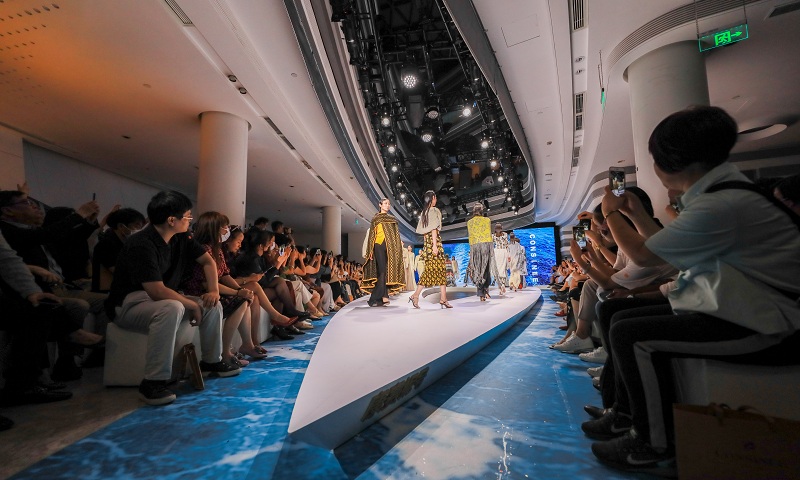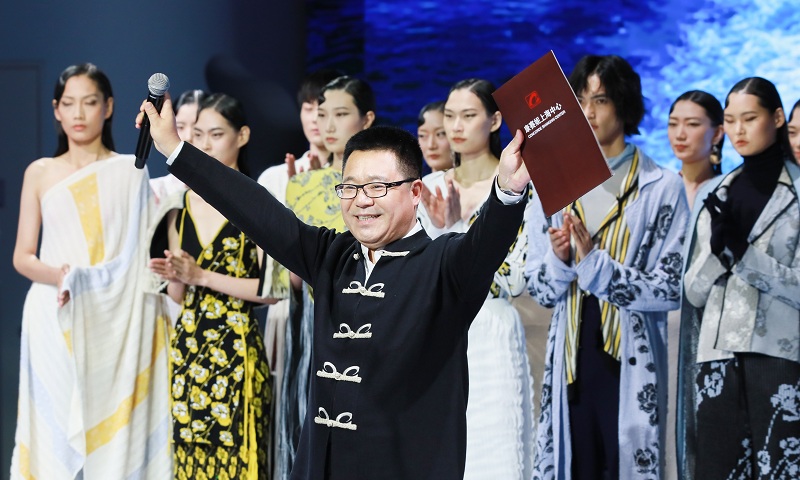
Models walk a runway showing more than 40 ready-to-wear garments designed by renowned overseas Chinese designer Steven Oo in Consinee Shanghai Center on September 2. Photos: Courtesy of Consinee Group
Amid the rhymes of graceful music and sound of the waves from the sea, a group of models walked a runway one after another in Shanghai in the evening of September 2, catching the eyes of the audiences with over 40 ready-to-wear garments made with the high-end cashmere yarn and exquisite spinning technologies of Chinese cashmere yarn manufacturer and exporter Consinee Group.
Directed by renowned overseas Chinese designer Steven Oo and attended by nearly 400 fashion insiders and Consinee's clients, the fashion show unveiled the Consinee Shanghai Center, a major fashion project by the yarn giant to explore the domestic market of luxury products and seek transition from a textile producer to a fashion brand in the post-COVID-19 era.
Located in Qingpu of Shanghai, the three-storey Consinee Shanghai Center is only one kilometer away from the city's landmark National Exhibition and Convention Center where the China International Import Expo takes place every year.
"We would like to make the Shanghai Center a hub of global luxury fashion trend," Xue Jingli, chairman of Consinee Group, told the Global Times, adding that "the facility will serve as a communication platform for international and domestic designers and buyers, an international exhibition center for new products and popular trends as well as a private club for high-end customization."
Seizing the opportunity
Founded in Ningbo of East China's Zhejiang in 1999, Consinee Group has been providing high-end yarn to international brands, and is now a supplier for more than 20 top fashion brands globally, including Max Mara, Burberry, Ralph Lauren and Calvin Klein.
Xue considers the potential of the Chinese luxury market as a key driver of Consinee's shift in business strategy, which was further manifested by the COVID-19 pandemic and the lockdowns that plagued key industries across the world.
According to a research by Bain & Co, China has begun to lead the way toward a recovery and Chinese consumers will account for nearly 50 percent of the market by 2025 as crucial growth drivers of the industry.
Notably, in some first-tier Chinese cities including Shanghai and Beijing, customers have been seen forming long queues outside luxury boutique stores.
For traditional manufacturing and fashion industries seeking global business, if they don't have a foothold in the Chinese market, they cannot have a global strategy, Xue said.
Consinee is the only Asian exhibitor at PITTI IMMAGINE FILATI, a renowned international exhibition of yarn collections, Xue said. "We hope that through the efforts of generations of Chinese ingenious entrepreneurs and professionals, we can jointly create the Chinese version and Shanghai version of PITTI FILATI in the future, and make Shanghai a dazzling fashion capital."

Xue Jingli, chairman of Consinee Group, delivers a speech at the launch of Consinee Shanghai Center on September 2.
Young spenders
Xue is even more optimistic about China's market because of the rising luxury consumption by youthful spenders.
According to a report by McKinsey in 2019, the post-80s and post-90s generations have powered the Chinese luxury market, as they account for 43 percent and 28 percent of the total luxury goods buyers in China, respectively, and contribute 56 percent and 23 percent of China's total luxury consumption.
"The young generations now favor domestic fashion brands," Xue said, which also provides an opportunity for Consinee to grow from a raw material supplier to a fashion brand.
To bring luxury products to more young groups, Xue believes that technological innovations in yarns and textiles will play a crucial role, which will lower costs and refine the quality and fashion looks.
Technological innovations matter
Consinee's industrial 4.0-version intelligent plant, planned in 2017 with an investment of 1 billion yuan ($146.28 million), will meet its consumers this year in Ningbo. The factory, built together with Germany's Siemens, will bring 10 environment-friendly and digitalized production lines that will save energy by 30 percent, reduce waste by 50 to 70 percent, and increase direct profits and taxes by 10 to 15 percent, Xue said.
"The factory will send a signal that the textile industry is not lagging behind," Xue said. "It will be a window of this industry, which we hope will bring confidence to peers in the textile industry in the post-pandemic period."
Xue sees textile as an industry that is an incubator of fashion and a base of technological innovations, and intends to break the stereotype that regards textile industry as a sunset industry, the desert of culture, or a depression of advanced technology. "Instead, it is an industry that brings people pleasure and joy with fashion and technological innovation," he noted. "Through smart manufacturing technologies, we can make the yarn lighter and thinner and meet fashion tastes."
The company, designated as a national high-tech enterprise, is equipped with both national and provincial-level R&D centers. It invests over 6.5 percent of its sales revenue in R&D and technological innovation every year, higher than the average 3 percent for the whole industry, according to Xue.
Despite the industry facing headwinds amid the pandemic, Consinee has seen a positive growth in the first half of this year, which has brought Xue confidence to further explore the global and domestic markets.
As a company integrating design, R&D, production, logistics, import and export, it provides more than 3,500 tons of yarn to the high-end market annually, wherein the amount of natural cashmere yarn exceeds 1,500 tons, and accounts for more than 10 percent of the cashmere production in the world.
